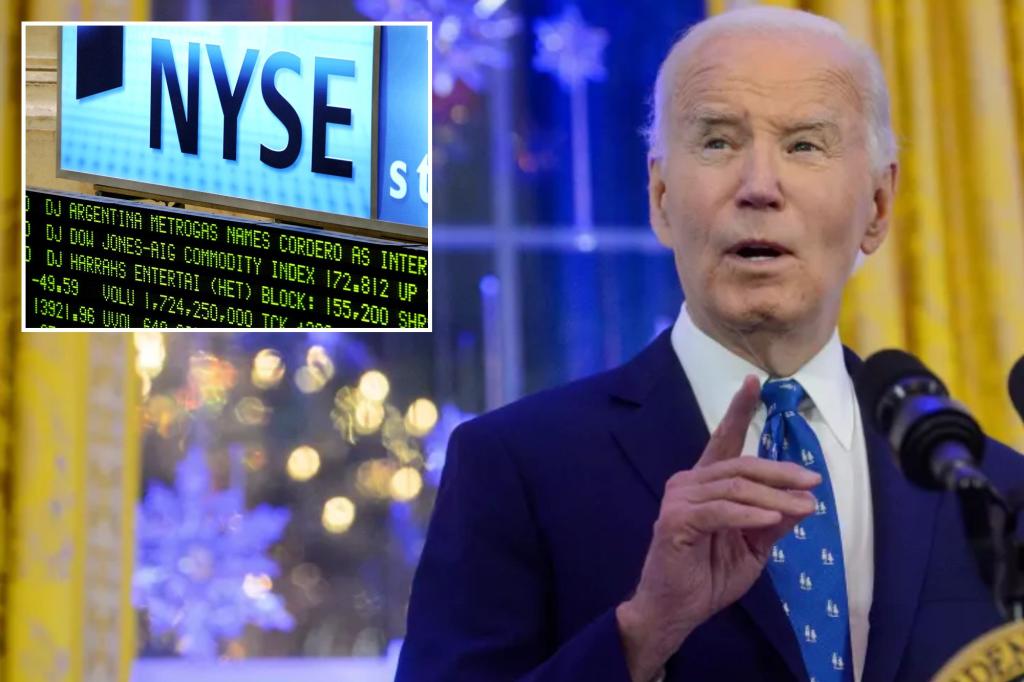President Biden’s recent endorsement of a ban on congressional stock trading marks a significant shift in his stance, bringing the long-simmering debate back into the spotlight. This declaration, delivered just weeks before the end of his first term, breaks years of silence on the controversial practice, raising questions about the timing and potential impact of his statement. Biden’s emphatic assertion that no member of Congress should profit from the stock market while in office reflects a growing public sentiment against the perceived conflict of interest inherent in the current system. He underscored the ethical dilemma faced by lawmakers who could potentially leverage their privileged positions for personal financial gain, emphasizing the importance of maintaining public trust and accountability.
The context of Biden’s pronouncement adds another layer of intrigue. The interview, conducted by a political advisor to Senator Bernie Sanders and published by a pro-labor organization, suggests a strategic alignment with progressive voices who have long championed stricter regulations on congressional stock trading. While the practical implications of Biden’s statement remain uncertain given the limited time remaining in his current term, it injects renewed momentum into the ongoing debate. It also contrasts sharply with the earlier position held by former House Speaker Nancy Pelosi, who initially resisted calls for a ban, defending the right of lawmakers to participate in the “free market.” This divergence of opinion between two prominent Democratic figures highlights the complex interplay of political and ethical considerations surrounding this issue.
Nancy Pelosi’s initial defense of congressional stock trading, rooted in the principle of free market participation, stood in stark contrast to the growing chorus of voices advocating for greater restrictions. Her argument, centered on the notion that lawmakers should not be excluded from investing, failed to quell the rising public concern over potential conflicts of interest. The controversy surrounding her husband’s substantial stock holdings and well-timed trades further fueled the debate, raising questions about the potential for insider trading and undue influence. While Pelosi later softened her stance, acknowledging the need for stricter enforcement of existing disclosure laws and extending them to the judiciary, the initial resistance underscored the deep divisions within Congress on this issue.
The timing of Pelosi’s hip replacement surgery and subsequent speculation about her future in Congress adds another dimension to the narrative. While unrelated to the stock trading debate, these events coincide with renewed scrutiny of her past positions and the potential impact of her departure on the legislative landscape. The incident involving her husband’s sale of Visa stock shortly before the Justice Department announced an antitrust lawsuit against the company further exemplifies the type of transactions that have fueled public distrust. While there is no suggestion of wrongdoing, the optics of such trades contribute to the perception of a system ripe for abuse.
The reported tension between Biden and Pelosi, stemming from her role in encouraging his withdrawal from the presidential race earlier this year, adds a further layer of complexity to Biden’s recent statement. This apparent rift between the two Democratic leaders suggests that Biden’s endorsement of a stock trading ban might not be entirely devoid of political maneuvering. While the substance of his argument resonates with ethical concerns and public sentiment, the timing and context suggest a potential element of political strategy, especially considering Pelosi’s previous resistance to such a ban.
Biden’s shift from a noncommittal stance to open support for a ban represents a notable evolution in his position. His earlier deference to congressional leadership on the issue, as conveyed by then-Press Secretary Jen Psaki, contrasts sharply with his current unequivocal call for legislative action. This change in approach signals a growing recognition of the political salience of the issue and the potential for gaining public support by aligning with the growing movement for greater transparency and accountability in government. The existing bipartisan proposal to ban stock trading by members of Congress and their families, while gaining traction, has yet to receive a vote, highlighting the challenges in translating public sentiment into concrete legislative action. The ongoing debate underscores the need for a comprehensive and robust framework that addresses both the ethical concerns and the practical considerations of regulating congressional stock trading.
The broader issue of congressional stock trading remains a complex and contentious one, with strong arguments on both sides. Proponents of a ban argue that it is essential to maintain public trust and prevent even the appearance of impropriety. They point to instances of seemingly well-timed trades and the inherent conflict of interest presented by lawmakers having access to non-public information. Opponents, on the other hand, argue that a ban infringes on the rights of lawmakers to manage their personal finances and that existing disclosure requirements are sufficient to ensure transparency. They also raise concerns about the practical challenges of defining and enforcing such a ban. The debate is further complicated by the fact that many lawmakers have substantial personal wealth and complex financial portfolios, making it difficult to draw a clear line between legitimate investment activity and potential abuse. The ongoing discussion highlights the need for a balanced approach that addresses the legitimate concerns of both sides while upholding the principles of transparency and ethical conduct in government.

